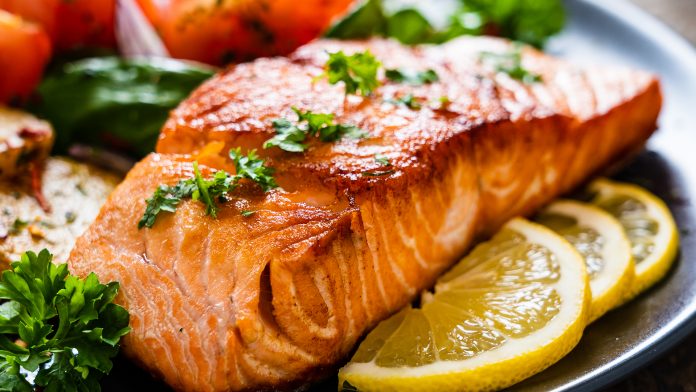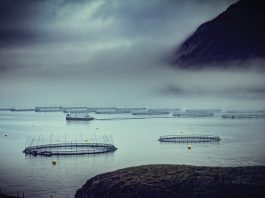Scientists at Bluu Biosciences are developing a method of growing cell-based fish, which could offer a sustainable alternative to fishing.
According to findings by the United Nations Food and Agriculture Organization, approximately 90% of the Earth’s fish supplies are overfished or maximally exploited. While this situation is already dire, as the world’s population continues to rise, and a greater number of people turn to fish as a source of protein, the need for a sustainable alternative will increase even more.
Bluu Biosciences
Now, Bluu GmbH – a spin-off of the Fraunhofer Research and Development Center for Marine and Cellular Biotechnology EMB – an associated center of the Fraunhofer Research Institution for Individualized and Cell-Based Medical Engineering IMTE – has a solution to this challenge.
This innovative company is focusing on the production of cell-based fish, which are made from real fish cells and grown in a bioreactor. On top of potentially providing a more sustainable alternative to fishing, this method of food production will not come at the expense of animal welfare.
Bluu Biosciences is the first of its kind in Europe to concentrate on the advancement and manufacture of cell-based fish, and across the world, there are only a few companies functioning in this industry; therefore, Bluu Biosciences is closing a gap in the market.
Currently, more fish are caught than can naturally regenerate; this poses a great threat to the basic food supply of hundreds of millions of people worldwide. Cell-based fish, manufactured with the assistance of modern biotechnology, can make a significant contribution to safeguard the global supply of animal protein in the future.
“We see a fast-growing market here. The future belongs to products manufactured in a circular economy,” explained Dr Sebastian Rakers, managing director and co-founder of Bluu GmbH alongside Simon Fabich.
Developing market-ready products
The co-founders’ vision for Bluu GmbH is to introduce the products to the market through restaurants as their first step. After this, they are aiming for the products to be available in supermarkets, with Rakers citing the end of 2023 as a realistic date for market launch.
Initially, the offered products will include hybrid products such as fish balls, fish sticks and fish tartar, which are comprised of a combination of cell components and vegetable proteins. Unfortunately, fish fillet is not going to be market-ready until a later date as far more research is necessary.
The difficulty currently faced by the manufacturers is to create a porous structural framework that enables adequate nutrients and oxygen to reach the cells. “This is essential to ensure that the cells are growing on the structural framework and form in the same way as they would in natural fish tissue,” commented the marine biologist.
Isolating cells from fish tissue
Dr Rakers and his team separate the cells from a biopsy coming from a piece of adult fish tissue. After this, the isolated cells, like progenitor cells or adult stem cells, are multiplied in the laboratory in an in-vitro culture. As they do not age, they can divide infinitely. The cells are then fed with a nutrient medium in the bioreactor. The reactor presently has a limit of five litres.
However, in order to achieve a marketable product, a larger reactor is essential. “We are not there yet, because we first have to refine the process steps needed by the cells to grow. Our current challenge is to take the step towards industrial production,” Rakers added.
Free from genetic engineering, antibiotics, and environmental toxins
There are many advantages to cell-based fish production: “There is no need to slaughter fish, and ideally, a biopsy is only required once,” explained Rakers. Currently, 30% of all fish stocks are overfished, while a staggering further 60% are exploited to the maximum. Whereas non-land-based aquaculture, which has been massively growing in popularity, can cause pollution of the oceans and eutrophication of waters, particularly in areas with little flow.
Other advantages when it comes to cultivated fish are its high nutritional value, its availability and the related short supply chains. Fish products produced from fish cells are free from genetic engineering, antibiotics, and environmental toxins. As well as this, it is possible to produce them on-demand with a decentralised approach. Dissimilar to the majority of aquaculture techniques, a cell-based factory can be set up anywhere in the world.
At present, the scientists are concentrating on enhancing the medium to ensure the fish cells are manufactured in an economical manner, as well as refining cell properties like flavour and texture. This can be accomplished by expanding the proportion of omega-3 fatty acids as a vital flavour carrier. The technology necessary for this was out-licensed from the Fraunhofer EMB.
On top of this, the team is working to supplant foetal calf serum (FCS) with different, plant-based growth factors and attain FCS-free manufacture. “FCS is derived from the blood of cow foetuses and is a major component of many growth media needed to grow and culture cells in cell cultures,” Rakers explains. “Our first prototype will be completely FCS-free.”
Bluu GmbH continues to cooperate closely with Fraunhofer EMB in its research work.









